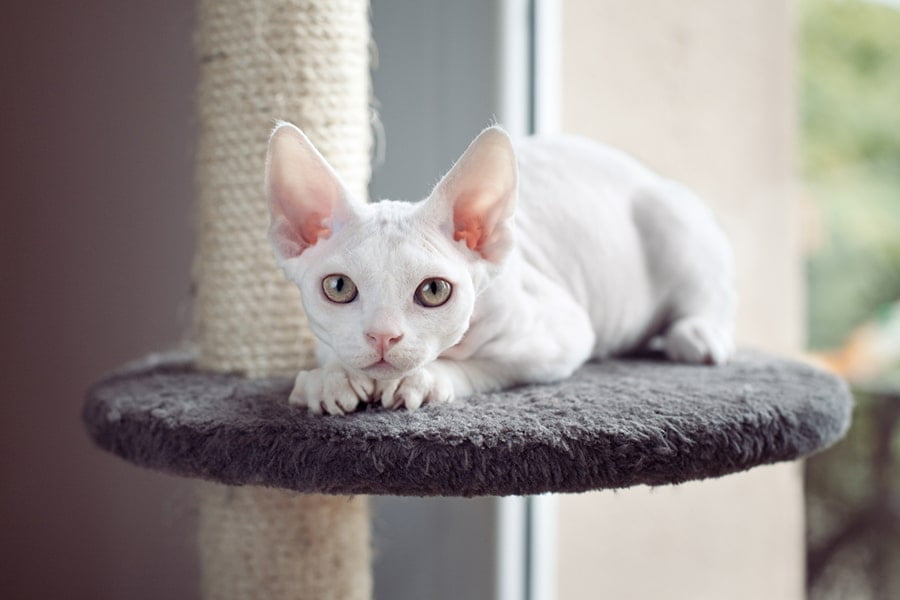Table of Contents
The Cornish Rex cat, known for its unique coat and playful personality, is a delightful companion. Proper care is essential to ensure your Cornish Rex remains healthy and happy. This guide provides valuable insights and tips on the care guide for the Cornish Rex cat, helping you provide the best for your feline friend.

1. Understanding the Cornish Rex Coat
The Cornish Rex has a distinctive coat that requires special attention:
- Unique Texture: Unlike other cats, the Cornish Rex has a wavy, soft coat that lacks a top layer of guard hairs.
- Minimal Shedding: Their coat sheds less than other breeds, making them a good choice for those with allergies.
- Regular Grooming: Gentle brushing once a week is usually sufficient to keep their coat in good condition.
2. Providing a Balanced Diet
A nutritious diet is crucial for your Cornish Rex’s health:
- High-Quality Food: Choose a high-quality cat food that meets the nutritional needs of an active, agile cat.
- Regular Meals: Feed your Cornish Rex regular, balanced meals to maintain a healthy weight.
- Fresh Water: Ensure fresh water is always available to keep your cat hydrated.
3. Ensuring Regular Exercise
Cornish Rex cats are energetic and playful, requiring plenty of exercise:
- Interactive Play: Engage your cat with interactive toys that stimulate their hunting instincts.
- Climbing Opportunities: Provide cat trees and shelves to satisfy their love for climbing and exploring.
- Daily Playtime: Spend time each day playing with your cat to keep them mentally and physically stimulated.
4. Maintaining Dental Health
Good dental hygiene is essential for your cat’s overall health:
- Regular Brushing: Brush your cat’s teeth regularly with a cat-specific toothbrush and toothpaste.
- Dental Treats: Provide dental treats and toys designed to promote oral health.
- Vet Check-Ups: Schedule regular veterinary check-ups to monitor your cat’s dental health and address any issues early.
5. Routine Veterinary Care
Regular veterinary care is vital for your Cornish Rex’s well-being:
- Annual Exams: Schedule annual veterinary exams to monitor your cat’s health and catch any potential issues early.
- Vaccinations: Keep your cat’s vaccinations up to date to protect them from common diseases.
- Parasite Prevention: Use vet-recommended flea, tick, and worm preventatives to keep your cat parasite-free.
6. Providing a Safe Environment
Creating a safe and comfortable environment is essential for your cat’s happiness:
- Indoor Living: Keep your Cornish Rex indoors to protect them from outdoor hazards and diseases.
- Cozy Spaces: Provide warm, cozy spaces for your cat to rest and relax, as Cornish Rex cats can be sensitive to cold.
- Safe Exploration: Ensure your home is safe for exploration, free from harmful plants, chemicals, and small objects that could be swallowed.
7. Social Interaction and Bonding
Cornish Rex cats thrive on social interaction and bonding with their owners:
- Quality Time: Spend quality time with your cat daily, offering affection and attention.
- Companionship: Consider getting a companion animal if you’re away from home often, as Cornish Rex cats can become lonely.
- Positive Reinforcement: Use positive reinforcement techniques to train and bond with your cat.
Conclusion on Caring for a Cornish Rex Cat
Providing the best care for your Cornish Rex involves understanding their unique coat, offering a balanced diet, ensuring regular exercise, maintaining dental health, scheduling routine veterinary care, creating a safe environment, and fostering social interaction. By following this care guide for the Cornish Rex cat, you can ensure your feline friend remains healthy, happy, and well-adjusted. For more information on cat care, visit the ASPCA and CFA.
FAQs on Caring for a Cornish Rex Cat
How often should I groom my Cornish Rex cat?
Gentle brushing once a week is usually sufficient to keep their coat in good condition, as they have a unique wavy coat that sheds minimally.
What type of diet is best for a Cornish Rex?
Provide high-quality, nutritionally balanced cat food that meets the needs of an active and agile cat. Regular, balanced meals and fresh water are essential.
How can I keep my Cornish Rex entertained?
Engage your cat with interactive toys, provide climbing opportunities like cat trees, and spend daily playtime to keep them mentally and physically stimulated.
What are common health issues in Cornish Rex cats?
Common health issues include dental problems and sensitivity to cold. Regular veterinary check-ups and proper care can help manage these concerns.
How can I maintain my Cornish Rex’s dental health?
Brush their teeth regularly with a cat-specific toothbrush and toothpaste, provide dental treats and toys, and schedule regular veterinary dental check-ups.
Should I keep my Cornish Rex indoors?
Yes, keeping your Cornish Rex indoors protects them from outdoor hazards, diseases, and extreme weather. Ensure your home is safe and provides ample stimulation.











